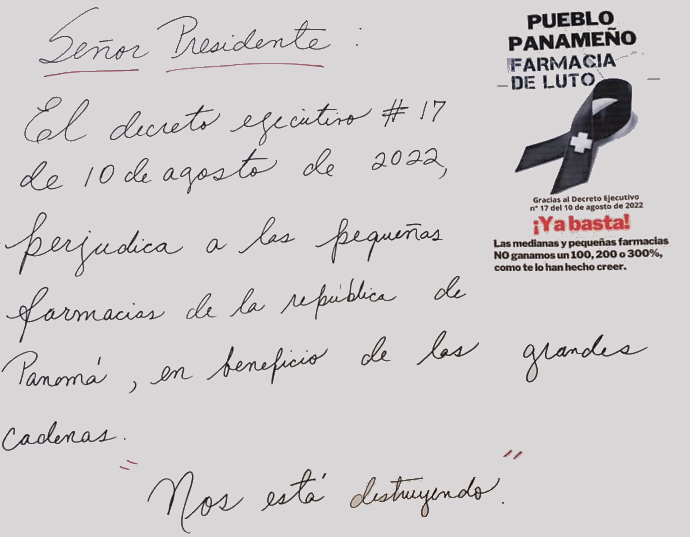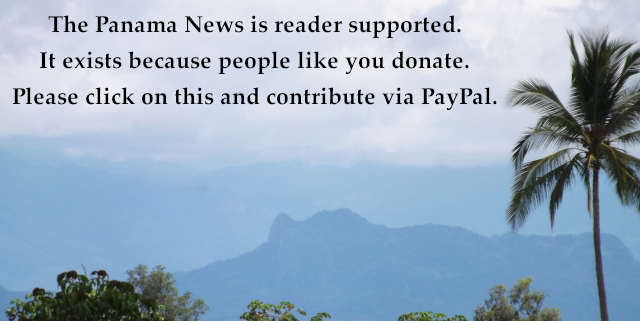“Mr. President,
Executive Decree #17 of August 10, 2022 prejudices the small pharmacies of the Republic of Panama, for the benefit of the big chains.
You’re destroying us.”
A Twitter note from protesting pharmacists, who shut their doors on Monday and Tuesday to make their point – and were more or less heard.
Small business moves to implement their new freedom by collective purchasing
by Eric Jackson
On August 17 the Cabinet Council sent legislation ending the importers’ exclusive distributorships for medications to the National Assembly, but in the meantime President Cortizo signed some executive orders beginning to implement the move.
Pharmacies will be allowed to import medicines without mandatory wholesalers. In Panama, where “popular capitalism” is a very big deal — some one-half of economically active people work in the informal sector, generally by themselves or in tiny micro-enterprise partnerships — the freedom of small businesses from controlling behavior by large ones is bound to garner a lot of public support.
There were only five importers allowed, some of them informally but more or less banded together as a cartel. While their defenders in the mass media and their online trolls haven’t let up with the arguments, they’re fairly quiet now. Before the president made his move, the big importers were demanding a negotiation process that included themselves, international pharmaceutical companies and the nation’s pharmacists (or at least the ones they would describe as qualified). The Catholic Church made it plain that they would mediate no such exercise, and Nito proceeded without one.
In the proposed legislation, “pharmacies” are defined as:
Establishments dedicated mainly to the preparation and retail sale of prescriptions, patent medicines, botanical drugs, chemical products, perfumes, cosmetics, and the activities of pharmacies in the countries with the greatest economic progress.
Mrs. Galindo De Obarrio, one of the big three importers and president of the Chamber of Commerce, won’t get to argue semantics. But if she warned in La Estrella that there is a danger of counterfeit, often not even generic, medications, the government let it be known that there would be steps to avoid this major international fraud problem and those steps would not include letting the present group of importers serve as the chokepoint.
Did we hear that on the world scale Big Pharma won’t deal with purchasers in small lots? That has been a common practice, but how insistent the drug manufacturers might actually be, we may not see. that’s because the National Union of Pharmacy Propietors — UNPROFA — which claims to represent about 70% of pharmacies, has announced that it will band the small outlets together to create a collective purchasing organization that filters out the frauds and buys as inexpensively as possible in bulk.
The legislature, and once they have acted the executive via its regulatory decrees, will take some commanding roles in how the new joint purchasing arrangement would have to operate. The Health Registry will take on an enhanced role in protecting against bogus or unapproved medications, and the Consumer Protection and Defense of Competition Authority will be overseeing the implementation of price controls. Consumer advocates are generally applauding the president’s move, but also calling for the safeguards that appear to be coming.
It may come to be, however, that the existing bureaucracy’s job will be simpler rather than more complex, as in dealing with one purchasing cooperative instead of five importing companies. One major question remaining to be answered, and it may be not only a matter of political will but also of contract law, is whether the current suppliers will continue their relationships with the Social Security Fund and Ministry of Health pharmacies. There had been a long effort to destroy the public pharmacies and make everyone buy privately. Will those who had posed as capitalism’s hardest-core defenders shift to defending the public sector if that’s where there only cut of the action remains? To be seen.
First things first, says UNPROFA leader Orlando Pérez in La Prensa. The small pharmacies are taking inventories of the price-controlled medicines they have in stock and for which they have paid cartel prices. They will be looking for some relief in the transition to the new system.
Contact us by email at fund4thepanamanews@gmail.com
To fend off hackers, organized trolls and other online vandalism, our website comments feature is switched off. Instead, come to our Facebook page to join in the discussion.
These links are interactive — click on the boxes












